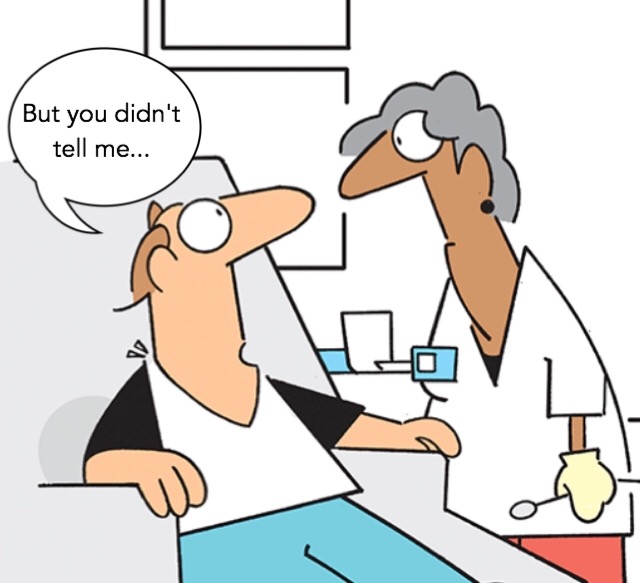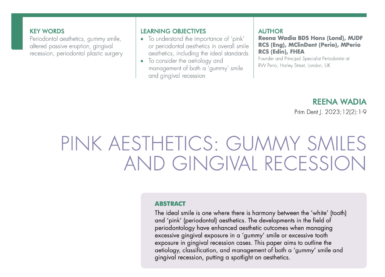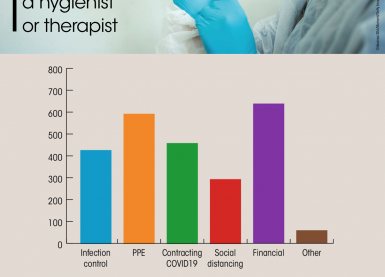May 26, 2016

1) Why do we need consent?
For legal reasons (converts unlawful touching into lawful practice), moral reasons (respect a patients right to self determination) and clinical reasons (makes it easier to treat patient with better outcomes).
2) What does the GDC Standards say about consent?
The GDC’s standards state that you must obtain valid consent before starting treatment, explaining all relevant options and costs. It is important not to assume that someone else has obtained the patient’s consent – this may be particularly relevant when considering referrals within the practice.
3) Is it a one-off?
Consent (and refusal) is not a one-off issue – this can change over time so you need to confirm consent prior to any treatment.
4) When is consent valid?
No other person can consent to treatment on behalf of an adult and to be valid, consent must be without coercion from operator or third parties. Coercion may be attempted by using emotionally charged words e.g. if trying to convince the patient not to have a root canal phrases like ‘drill deep into the tooth’ and ‘remove the nerve’ may be used. Be aware of the effect of language on patients.
5) Who can give consent?
- In order to make a decision for themself, the patient must have capacity. We assume capacity for anyone over 18 years of age. If there are concerns over capacity a functional test will determine capacity through testing the patient’s ability to understand, retain, weigh and communicate the treatment options.
- Children 16-18 – a child can consent on his/her own behalf. But if the child refuses, a parent or court can override the refusal (doesn’t usually work well in dentistry).
- Children <16 – presumed to be incompetent and need parental consent. But children may have capacity even if they are under 16 years old i.e. they may be Gillick competent. However, be aware that the threshold for this increase as complexity of procedure increases e.g. you may be happy to do a fissure sealant but perhaps not an extraction.
- Non-competent minors – Anyone with parental responsibility can consent and both parents not required for most procedures. Teachers/child minders are entitled to do what is reasonable to safeguard or promote the child’s welfare (Children’s Act 1989). In an emergency when there is no one with parental responsibility around, a clinician would be able to provide treat. If it is reasonable to delay the treatment until the parents are available, then the treatment should not be carried out.
- Adults who lack capacity – increasing problem with an ageing population and an increase in conditions such as dementia. If a patient is incompetent, they may be treated without their consent (Mental Capacity Act 2005). Perform a 2 stage test: Stage 1 – are they suffering from an impairment? Is there an impairment or disturbance in the functioning of the person’s mind or brain? Impairment can be temporary or permanent. Stage 2 – is the impairment sufficient such that the person lacks the capacity to make that particular decision? It will be dentist who decides if patient has capacity to consent or not – if you decide they don’t have capacity, your record keeping of this will be extremely important – you need to record which aspect of the test they fail on.
6) How much information do I need to give?
There are usually a number of treatment options available for a particular clinical scenario. The patient must have sufficient information upon which to make a decision. When discussing risks, the dentist should be reasonably aware of what that particular patient would attach significance to (Montgomery rules) – just because there is a low percentage for a risk it doesn’t mean you don’t tell the patient. You have to judge if that patient will attach significance to it – so clearly it’s important to get to know your patient as more than just a mouth!
7) What do I do if my patients don’t remember what I tell them?
Studies show that 40-80% of medical information is forgotten immediately and the greater the amount presented, the lower the amount recalled. It’s helpful to provide written text backing up relevant information that you have discussed. It’s also useful to ask patients to repeat back what they can recall so you can make any clarifications.
8) When do I need a signed FP17DC form and when do I need written consent?
You need a signed FP17DC form for band 2 treatment, band 3 treatment, band 1 if the patient requests it or if carrying out a mix of NHS and private work. Legally, you only need written consent for GA and sedation. But for risk management purposes, it is also recommended for high impact procedures e.g. wisdom teeth and elective procedures e.g. orthodontics, cosmetic dentistry and implants. A signature alone is not consent but it does show you’ve gone through a process. It’s the process itself which protects you and the patient. Similarly, consent forms are a good idea but not a substitute for good communication.
9) Am I allowed to record my conversation with a patient?
Yes, with the patient’s permission. If you do this, it should be with the aim of delivering the best possible care to the patient rather than working defensively. It may be useful for complicated treatment plans. However, you will need to consider retrieval and data protection issues.
10) What do I do if my patient doesn’t speak English?
The consent process can be difficult if the patient doesn’t speak English. Try to request professional interpreters rather than friends or relatives.



